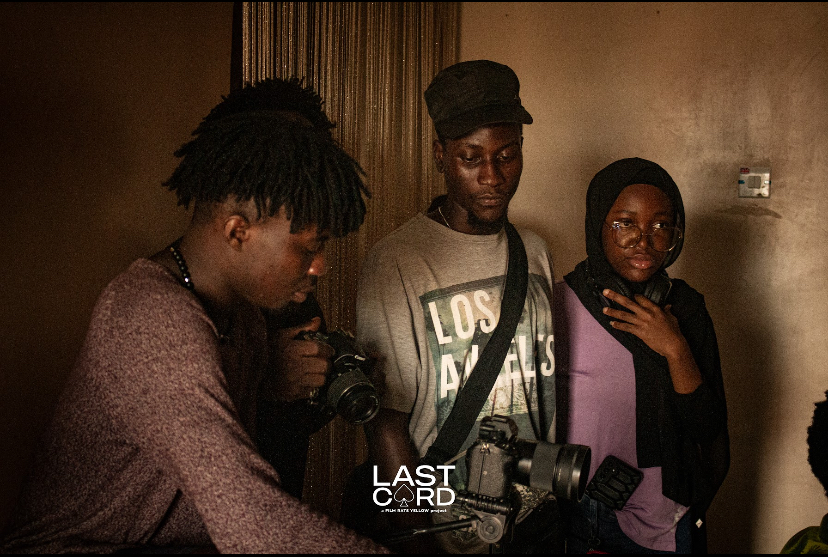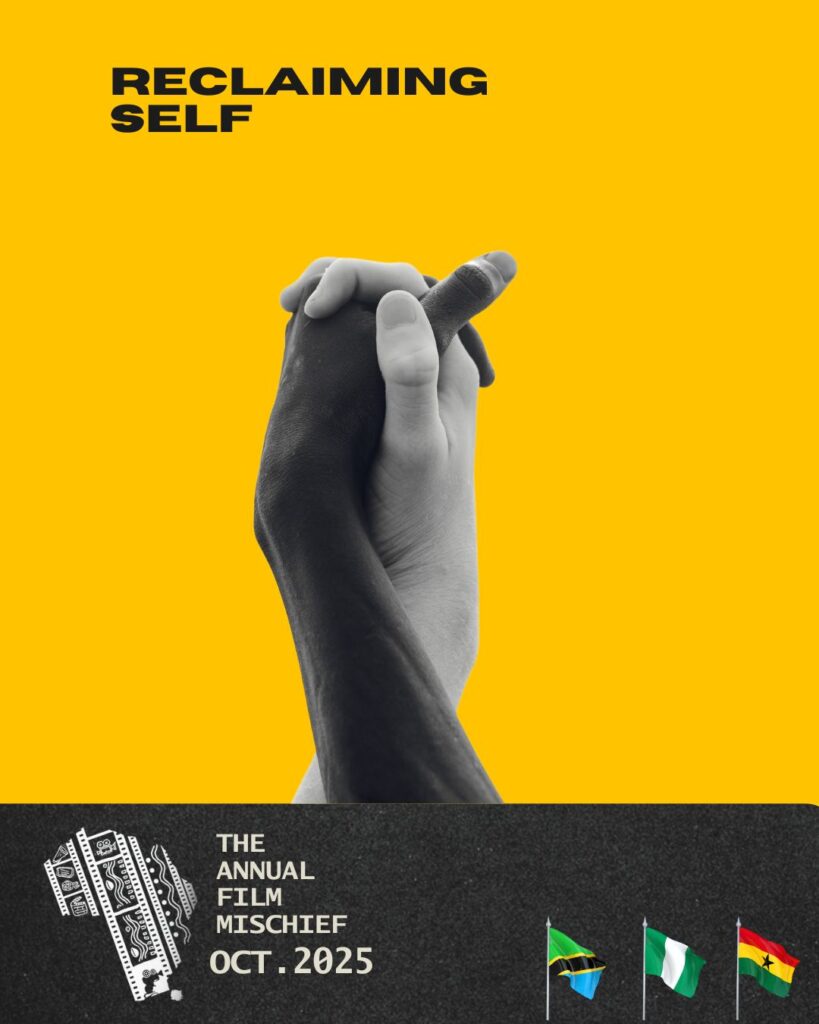By Adejumobi Oluwatomiloba
Weeks before the production of Last Card, I was added to a WhatsApp group named The Motherless. My mother had just passed away during the short three-week break the University of Ibadan had given us. There was no room to grieve. On resumption day, I found myself heading—not home, not to process—but to the outskirts of the university, alongside Keona, the film’s production designer, to begin work on the set.
I was new to film production, still learning the ropes. I assisted the production designer, Keona, with her design tasks and lent a hand to the welfare team whenever I could. It was all a blur—grief, work, newness, unfamiliar faces. The activities on set, when the actors let loose with their crying, brought back memories of my recent loss and my reaction to it. This motivated me to tell one of the Assistant directors (Chabod) that I didn’t react this way when my mother died. I must have cried once or twice, and that was even a day after my mother had died. Observing the actors’ reaction to a tragedy made me question the plausibility of their performance. However, as life would teach me, I learnt that people’s experiences and reactions to news differ. Enough of my life history. Let’s talk about Last Card.
The story follows two siblings, Remilekun (Ethan Abanikannda) and Ayomide (Elizabeth Gbamboye), who lose their father in an accident. The screeching sound that opens the film suggests he died in a car crash. Entering into the film, we would experience this unique combination of this screeching sound, a visual of several hands fiddling with a game card, intermittent blackouts, and the frail voice of a supposedly dying man apologising to his children and promising them a better life in courtesy of his sister, who is their aunt. The weary voice of the children pleading with their father to “fight” would also be heard. The latter would remind me of Dylan Thomas’ Do Not Go Gentle into that Good Night. The poem resounds with the words, “Rage, rage against the dying of the light.”
Watching this opening scene, we are blessed with a unique audiovisual effect of unseen voices and card-fiddling hands. This would make me appreciate the creative and thrilling work that occurred during the post-production activity. I was taken aback with utter admiration at the outcome of a production that took a linear motion in my eyes. All I’m trying to say is that the scenes were edited into fine cuts, and I was awed by it.
The film rises from its prologue to the bereaved faces of Remilekun and Ayomide as they become saddled with the task of hosting their sympathisers as they troop in one by one to render, “I’m so sorry for the loss,” “They said your father died, how, when?” “Chai!” “Stop crying,” “Stay strong, you hear,” “I will call you from time to time, and don’t forget to come for weekly service.” A means to prevent isolation. These are typical words of condolence that the bereaved must remain recipients of because it’s the African way—the expected way.

The Nigerian Way of Handling Grief: Expectations vs. Reality
Death is considered a communal event in the Nigerian society, be it the death of an old or a young person. When someone passes away, it is expected that neighbours, families, friends, and associates visit to console and show solidarity with the grieving family. Common phrases like “Eyaa,” “sorry,” and “stay strong” are meant to provide comfort. The house of the deceased is filled with people offering moral support, material support, and endless promises. The sad reality is that sometimes their words of support are generic— a cliche— such that they are not accompanied by true acts of support. Also, the support they offer is often transient, as people move on quickly from others’ tragedies. Also, phrases like “stay strong” could sometimes place the burden of resilience on the bereaved, trivialising their need to express and gradually live through their grief.
For me, I was fortunate enough to estrange myself from the community the moment the sad news of my mother’s demise dropped. My escape didn’t mean to disregard the condolences of the community, I just couldn’t find myself sitting in a midst of people crying, showcasing their bewilderment, and urging me and my siblings to stay strong. So, I left the house. This is, however, not the case with Remilekun and Ayomide, who suffer the need to conform to the societal way of attending to grief for the second time. They must heed people’s condolences and stay strong regardless of the hurt. They must also learn to survive on their own, whether or not constant support shows up. Last card richly mirrors the Nigerian way of dealing with grief.
Where is the depth in all of this?
I ask myself. A film where two adults cry throughout without giving much valid depth for the audience to feel their grief. The story of the dead or their deeds on earth determines if their exit should be painful or not. This film, however, doesn’t provide much information as to who the deceased was. What were their fathers’ aspirations? What were his dreams? What legacy or mark did he leave behind that should be worth the viewers’ grief?
All I’m left to feel is the actors’ outward sadness, not really the gravity of what has been lost or the persona of who left them in a void. A quick mention of Adaptation, a brilliant film written by Charlie Kaufman. This film follows the story of twin brothers (Charlie and Donald) presented as opposites. While Charlie is a worried, self-conscious, and perfectionist screenwriter, Donald is his direct opposite, an untroubled, optimistic screenwriter willing to embrace a conventional storytelling narrative. The latter isn’t so anxious about originality compared to his brother. What am I driving at? Donald reflects a part of Charlie that he struggles to embody… somebody ready to take risks and accept imperfections. Donald’s nature throughout the film is an inspiration to his twin brother, a truth the latter would later accept when they are faced with imminent death. Donald dies in the story, his death becoming a loss to Charlie. His death would represent a loss of Charlie’s counter-balance. We would have said he loses what he aspires to become through his brother’s death. However, the fortunate reality is that his fears and insecurities die as well. Charlie would soon learn to live above his insecurities, fears, and setbacks. This is a legacy he must carry on after his twin brother’s demise.
With this said, Donald’s death was worth grieving. I felt the loss his twin brother felt. He was an integral part of his brother’s life and a driving force in the story. He was a source of inspiration for Charlie’s creativity and would later contribute to the progress and completion of his screenwriting project at the end of the story. Donald’s death meant something to Charlie and the viewers as well.
There is, however, no such thing in Last Card. All we know is, “Your father was a great man. He was someone the whole church looked up to.” Even if we do not witness his time alive, a comprehensive description of what he was should have been provided. I guess it would have made much more sense. There could have been a sense of intimacy with the dead, such that grieving alongside the actors would be worth it.
Nonetheless, the actors made some interesting choices, right from Ethan Abanikannda’s heartfelt tears that shook me to Elizabeth Gbamboye’s flawless portrayal of helplessness and trauma. Adeleke Abiodun Floral (Mama Bose)’s skillful portrayal of a typical concerned neighbour and Ayenimelo Tosin (Femi)’s representation of mourners who dare to unleash their lethal appetite for a drink regardless of a dire situation were humorous. It was also the latter’s first time on set. Adedeji “Natural” Silas’s performance is also a pass.
Last Card, a Film Rats Yellow 2024 project, is a film that mirrors the Nigerian way of dealing with grief through the lens of its characters who are faced to conform with the societal norm of accepting condolences no matter how ephemeral or shallow they come.
Watch LAST CARD









8 thoughts on “Grief, the Nigerian Way: A Newbie’s Take on Last Card”
Tur Scripti
4oigy2
7e78hq
I’m curious to find out what blog system you happen to be utilizing?
I’m having some minor security problems with my latest website and I would
like to find something more secure. Do you have any suggestions?
Hello to every single one, it’s really a nice for me to go to see this web site,
it consists of helpful Information.
hi!,I really like your writing very a lot!
share we keep up a correspondence more approximately your article on AOL?
I require an expert on this area to resolve my problem.
Maybe that’s you! Taking a look forward to look you.
pmz8a8
vbqjp9